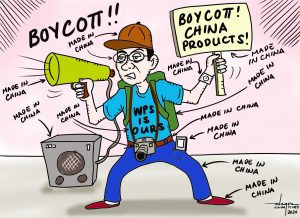All the while we were thinking that Davaoeños have for long been waiting for the start of the construction of the Davao City-Island Garden City of Samal bridge. The project had been the subject of wishful thinking as early as in the 70s.
The thought is that finally, after several decades of waiting, the bridge will come to reality with the assumption of former Davao City Mayor Rodrigo R. Duterte as President of the Philippines. After all, with a Davaoeño at the helm of the national government who would ever think that such a project would still be set aside?
Besides, in the numerous deliberations of the Regional Development Council (RDC), the advisory body for the crafting of the development program of the regions, there was never any hard indication that there was opposition to the project. The only semblance of a controversy was when some political leaders who were leading members of the RDC wanted the mainland Davao end of the bridge be located in nearby Panabo City in Davao del Norte. The reason advanced was that it may be less costly if one end will be in Panabo since the areas that will be affected have less development in place. Thus acquisition of right-of-way may not be requiring more resources that could result in the bloating of the cost of the project.
But when President Duterte assumed office the proposal to have the mainland end of the bridge be transferred to Panabo City seemed to have died down. Many, including us, presumed that everything was settled and the final proposal approved by the National Economic Development Authority (NEDA) board is the one that has the mainland end of the multi-billion peso bridge in Davao City.
Now that the approval is given and what is left is the start of the construction, come this report by no less than Davao City Mayor Sara Duterte-Carpio that again the project will be delayed.
The reason, according to Mayor Sara, is that a family whose land will be traversed by the Davao approach of the bridge has filed a written opposition to the Department of Public Works and Highways (DPWH).
The mayor was quoted in the report as further saying that the family is set to file a “Writ of Kalikasan” before the court.
This Writ of Kalikasan is a legal remedy under Philippine law that provides for protection of one’s constitutional right to a healthy environment as outlined in Section 16, Article II of the Constitution.
Well, there is no argument that every Filipino is entitled to protection to any affront to his constitutional right for a healthy environment. Along this context, will the family that the mayor did not identify, convince their fellow Davaoeños especially those residing in the vicinity of their property, to join them in the filing of the issuance of the writ?
If they do and their neighbors and other city residents will refuse them would it mean that they are the only ones who deserve the protection of the writ? Will the Court grant their demand? What if the Court does so and instead order the DPWH to relocate the mainland approach in an area outside of that of the family’s opposing the passage of the approach in their land? And what if the owner/s of properties beside or adjacent their land allow the use of their area, will that opposition still files for a Writ of Kalikasan?
From where we are perched, we view this dilly-dallying move as a scheme to let government come across the property owners’ demand for much bigger disposal cost of their land for the right-of-way.
But while we agree that it is also the family’s right to demand what they think is fair compensation of their property, fairness should not also be a one-way strait. The said family must also give due consideration to the fact that fairness needs to work for the greater majority of the public who would be beneficiaries of the bridge when this is completed.
Yes, there has to be some limits to one’s personal greed. It has to be moderated. After all, with that family’s property being traversed by the bridge’s approach, the likelihood is that the land value will double, even quadruple in only a year of two after the bridge’s completion.
So, why hide the true intention invoking constitutional right of people to a healthy environment when in reality it is the family’s safe deposit box that is intended to be filled to the brim?
As we usually say about development, it is something that if desired, will always have beneficiaries and sufferers. But the real measure, if indeed it serves its purpose, is when the beneficiaries are many times over the number of sufferers.
We recommend that the Court, the DPWH and the government for that matter, take wisdom from our preceding statement if it is the good of the majority that they are thinking about in finally giving the green light to the Davao-Samal bridge project.

